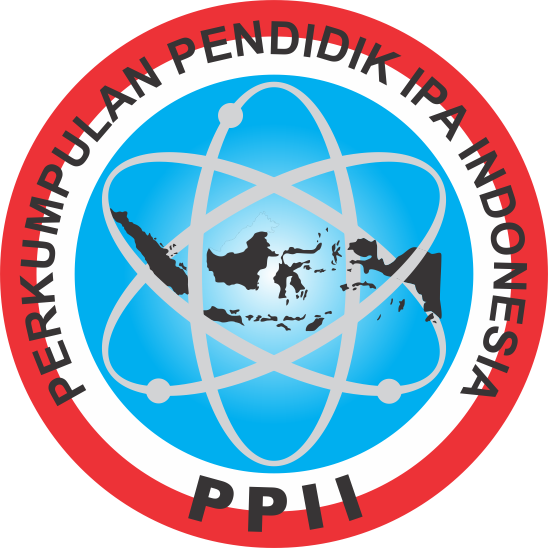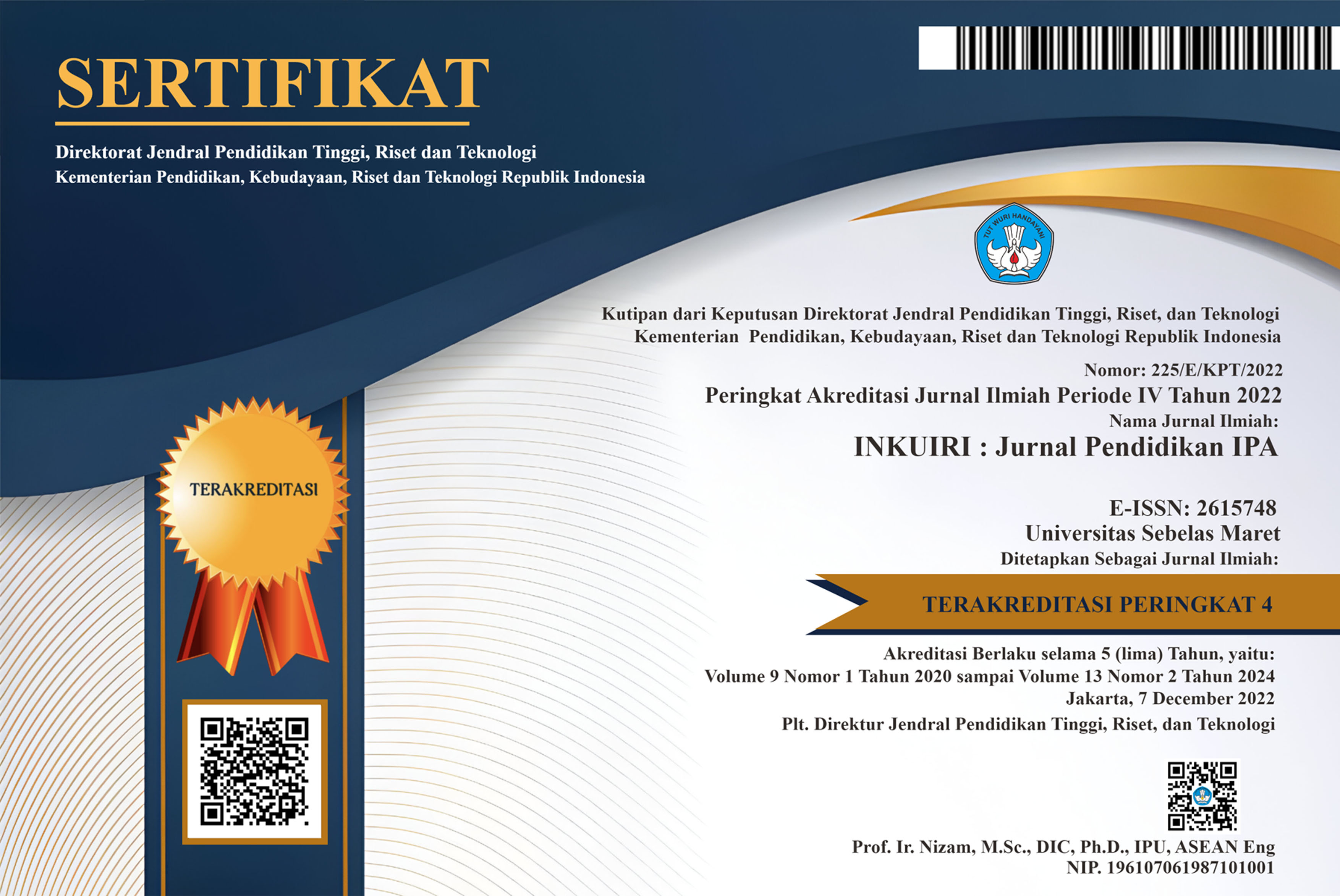Application of Group Investigation (GI) Learning Model to Improve Biology Cognitive Ability and Cooperation of Class X-10 Students of SMA Negeri 2 Nganjuk
Abstract
Tingkat pemahaman siswa terhadap konsep-konsep sains masih tergolong rendah. Hal ini terlihat dari rendahnya hasil belajar siswa dalam aspek kognitif. Penelitian bertujuan untuk menganalisis model Pembelajaran Group Investigation (GI) untuk meningkatkan kemampuan kognitif biologi dan kerja sama siswa. Jenis penelitian adalah tindakan kelas dengan tiap siklus terdiri dari tahap perencanaan, pelaksanaan, observasi dan refleksi. Subjek penelitian melibatkan 36 siswa kelas X-10. Metode pengumpulan data dengan observasi dan tes. Teknik analisis data menggunakan analisis kuantitatif deskriptif. Hasil penelitian menunjukkan siklus 1 dan 2 hasil belajar menjadi lebih baik siswa pada aspek kognitif sebelum diberi tindakan dan setelah diberi tindakan sebesar 100%, hasil belajar menjadi lebih baik pada aspek psikomotor dan afektif dari siklus I ke siklus II berturut-turut 76% dan 100%. Simpulan penelitian yaitu penerapan model Pembelajaran Group Investigation (GI) dapat meningkatkan kemampuan kognitif biologi dan kerja sama siswa. Implikasi penelitian diharapkan adanya model Pembelajaran Group Investigation (GI) akan dapat mengembangkan kemampuan kerja samanya dan matematisnya karena model ini membantu siswa memecahkan masalah melalui percobaan atau penelitian sederhana.
The level of students' understanding of science concepts is still relatively low. This can be seen from the low student learning outcomes in the cognitive aspect. The research aims to analyze the Group Investigation (GI) learning model to improve students' biological cognitive abilities and collaboration. The type of research is classroom action with each cycle consisting of planning, implementation, observation and reflection stages. The research subjects involved 36 students in class X-10. Data collection methods are observation and tests. The data analysis technique uses descriptive quantitative analysis. The results showed that in cycles 1 and 2 students' learning outcomes were better in the cognitive aspect before being given action and after being given action by 100%, learning outcomes were better in the psychomotor and affective aspects from cycle I to cycle II respectively 76% and 100%. The conclusion of the research is that the application of the Group Investigation (GI) learning model can improve students' biological cognitive abilities and collaboration. The research implications are that it is hoped that the Group Investigation (GI) learning model will be able to develop cooperation and mathematical abilities because this model helps students solve problems through simple experiments or research.
Keywords
Full Text:
PDFReferences
Abbas, E. W., Rusmaniah, R., Mutiani, M., Putra, M. Jumriani, J., and A. H. (2022). Including Information on River Tourism in Social Studies Using instructional materials to improve students' comprehension. Journal of Social Studies Innovation, 4(1), 11. https://doi.org/10.20527/iis.v4i1.6312.
Astuti, B. (2017). Investigasi Model Grup untuk Meningkatkan Motivasi dan Hasil Belajar IPS Siswa Kelas VI SD Mimbar Sekolah Dasar, 4(3), 264. https://doi.org/10.17509/mimbar-sd.v4i3.7843.
Asrori, & Rusman. (2020). Classroom Action Reserach Pengembangan Kompetensi Guru. In Pena Persada.
Asyari, M., Al Muhdhar, M. H. I., Susilo, H., & Ibrohim, I. (2016). Improving critical thinking skills Through the integration of problembased learning and group investigation. Internasional Journal for Lesson and Learning Studies, 5(1), 36–44. https://doi.org/10.1108/IJLLS-10-2014-0042.
Buyukkarci, K. (2021). The Impact of Formative Assessment on Students ’ Assessment Preferences. The Reading Matrix: An International Online Journa, 21(1), 142–161.
Christina, L. V., & Kristin, F. Menurut (2016), Model Investigasi Tipe Grup (Gi) dan Model Cooperative Integrated Reading and Composition (Circ) Berhasil Meningkatkan Kreativitas Berpikir Kritis dan Hasil Belajar Ips Siswa Kelas 4. Scholaria :Jurnal Pendidikan dan Kebudayaan, Vol. 6, No. 3, 217–230.https://doi.org/https://doi.org/10.24246/j.scholaria.2016.v6.i3.p217-230
Devi, K. S. T., Wibawa, I. M. C., & Sudiandika, I. K. A. (2021). Penerapan Model pembelajaran Kooperatif Jenis Group Investigation (GI) untuk Meningkatkan Hasil Pembelajaran Matematika Kelas V. Mimbar Ilmu, 26(2), 233–242. https://doi.org/10.23887/mi.v26i2.36079.
Dewi, P. P. Y., Manuaba, I. S., & Suniasih, N. W. (2018). Pengaruh Model Group Investigation Pembelajaran Berbasis Proyek Terhadap Hasil Belajar IPA Siswa Kelas IV. Internasional Elementary Education Journal, 1(4), 264. https://doi.org/10.23887/ijee.v1i4.12957.
Eka Lengari, M. P., & Agustika, G. N. S. (2020). Pengaruh Model Pembelajaran Group Investigation (GI) Berbantuan Media Flash Card Terhadap Kompetensi Pegetahuan IPA. Jurnal Studi dan Pengembangan Pendidikan, 4(1), 65. https://doi.org/10.23887/jppp.v4i1.25032.
Febiyanti, D., Wibawa, I. M. C., & Arini, N. W. (2020). Pengaruh Model Pembelajaran Kooperatif Jigsaw-Assisted Mind Mapping terhadap Kemampuan Berbicara. Mimbar Ilmu, 25(2), IniGusti Nyoman Astini / Model Group Investigation untuk Meningkatkan Kinerja Pembelajaran Biologi Siswa Kelas X IPA 1 SMA Journal Action Research in Education,Vol. 7, No. 2, Tahun 2023, pp. 298-302 302 282–294. https://doi.org/10.23887/mi.v25i2.26620.
Hanifah, A., Mudzanatun, dan Sukamto. Jurnal Ilmiah Pendidikan Profesi Guru, 3(3), 443. Keefektifan Model Investigasi Kelompok Pembelajaran Mempengaruhi Hasil Belajar IPA. https://doi.org/10.23887/jippg.v3i3.29244.
Makaborang, Y. (2019). Evaluasi Implementasi Kurikulum 2013 Mata Pelajaran Biologi Di SMA Negeri. Jurnal Manajemen Pendidikan, 6(2). https://doi.org/10.24246/j.jk.2019.v6.i2.p130 145.
Mariani, M. (2021). Untuk Meningkatkan Prestasi Belajar Fisika Siswa SMAN 4 Tebo, Digunakan Model Pembelajaran Tipe Divisi Prestasi Tim Siswa. Jurnal Inovasi Strategi Pembelajaran dan Model, 1(2), 200–206. https://doi.org/10.51878/strategi.v1i2.608.
Martiningsih, M., Situmorang, R. P., & Hastuti, S. P. (2018). Hubungan Keterampilan Generik Sains Dan Sikap Ilmiah Melalui Model Inkuiri Ditinjau Dari Domain Kognitif. Jurnal Pendidikan Sains (Jps), 6(1), 24. https://doi.org/10.26714/jps.6.1.2018.24-33.
Mulyadinata, I. P. L., Wiyasa, I. K. N., & Suniasih, N. W. (2020). Peran Model Investigasi Pembelajaran Grup Berbasis Media Lingkungan Terhadap Kemampuan Pengetahuan IPA. Jurnal Edutech Undiksha, 8(1), 102–111. https://doi.org/10.23887/jeu.v8i1.27182.
Nuro, F. R. M., Suwandayani, B. I., & Majid, I. N. (2020). Penerapan Literasi Sains di Kelas IV Sekolah Dasar. Jurnal Pemikiran Dan Pengembangan Sekolah Dasar (JP2SD), 8(2), 179 187. https://doi.org/10.22219/jp2sd.v8i2.15189.
Pantiwati, Y. (2016). Hakekat Asesmen Autentik dan Penerapannya dalam Pembelajaran Biologi. Journal of Mathematics and Science Education, 1(1), 18.https://doi.org/10.25273/jems.v1i1.773.
Putra, P. N., Margunayasa, I. G., & Wibawa, I. M. C. (2019). Pengaruh Model Pembelajaran Kooperatif Investigation Group (GI) Berbasis Lesson Study Terhadap PenguasaanKonsep IPA. Jurnal Pedagogi Dan Pembelajaran, 1(2), 84–93.https://doi.org/10.23887/jp2.v1i2.19329.
Rahayu, A. H., & Anggraeni, P. (2017). Analisis Profil Keterampilan Proses Sains Siswa Sekolah Dasar Kabupaten Sumedang. Jurnal Pendidikan Dasar Dan Humaniora, 5(2), 22–33. https://doi.org/10.24815/pear.v7i2.14753.
Rokhimawan, M. A., Badawi, J. A., & Aisyah, S. (2022). Model-Model Pembelajaran Kurikulum 2013 pada Tingkat SD/MI. Jurnal Ilmu Pendidikan, 4(2), 2077 – 2086. https://doi.org/10.31004/edukatif.v4i2.2221.
Stellmacher, A., Ohlemann, S., Pfetsch, J., & Ittel, A. (2020). Motivation for pre-service teachers' career choices: A comparison between German comprehensive school teachers and teachers pursuing vocational education and training. The International Journal of Vocational Education and Training Research, 7(2), 214–236. https://doi.org/10.13152/IJRVET.7.2.5
Styowati, E., & Utami, F. (2022). Menghasilkan Video Pembelajaran Sains Berbasis Masalah, Jurnal Obsesi: Jurnal Pendidikan Anak-Anak 4, 2472–2482. https://doi.org/10.31004/obsesi.v6i4.1970.
Suarni, G. L., Rizka, M. A., Zinnurain, Z. (2021). Journal of Children's Education. Analisis Efek Model Pembelajaran Sains Teknologi Masyarakat pada Prestasi Belajar Siswa. Jurnal Paedagogy, 8(1), Usia Dini31–38. https://doi.org/10.33394/jp.v8i1.3226.
Subudi, I. K. (2021). Peningkatan Aktivitas dan Hasil Belajar Biologi Sebagai Dampak Penerapan Model Investigasi tentang pembelajaran kooperatif berbasis kelompok. Journal of Education Action Research, 5(1), 17– 25. https://doi.org/10.23887/jear.v5i1.32131.
Sudarsana, I. K. (2018). Pengaruh Model Pembelajaran Berkolaborasi Terhadap Hasil Belajar Siswa. Jurnal Penjaminan Mutu, 4(1), 20. https://doi.org/10.25078/jpm.v4i1.395
Sumertha, I. G. (2019). Penerapan Model Pembelajaran Kooperatif Tipe Group Investigation (GI) Untuk Meningkatkan Hasil Belajar IPA Siswa. Jurnal Pedagogi Dan Pembelajaran, 2(2), 195–202. https://doi.org/10.23887/jp2.v2i2.17908.
Suwarsa, I. W. (2020). Implementasi Model Pembelajaran Kooperatif Tipe Student Team Achievement Aivision untuk Meningkatkan Prestasi Siswa. Indonesian Journal of Educational Development, 1(2), 274–282. https://doi.org/10.5281/zenodo.4004199.
Suwela, I. K. (2021). Penerapan Model Pembelajaran Kooperatif Berpikir Berpasangan dan Berbagi Untuk Meningkatkan Prestasi Belajar Matematika. Journal of Education Action Research, 5(1), 95–101. https://doi.org/10.23887/jear.v5i1.32653.
Tembang, Y., Harmawati, D., & Rahajaan, J. P. (2019). Siswa Meningkatkan Hasil Belajar IPA Melalui Penerapan Model Pembelajaran Kooperatif Berbasis Grup Investigasi di Sekolah Dasar. Jurnal Ilmiah untuk Pendidikan Dasar, 3(2), 230. https://doi.org/10.23887/jisd.v3i2.17643
Yusnia, Y. (2019). Penggunaan Scribe Video untuk Mengajarkan Literasi Sains kepada Mahasiswa PGPAUD. Cakrawala Dini: Jurnal Pendidikan Anak Usia Dini, 10(1), 71–75.https://doi.org/10.17509/cd.v10i1.17436.
Refbacks
- There are currently no refbacks.






